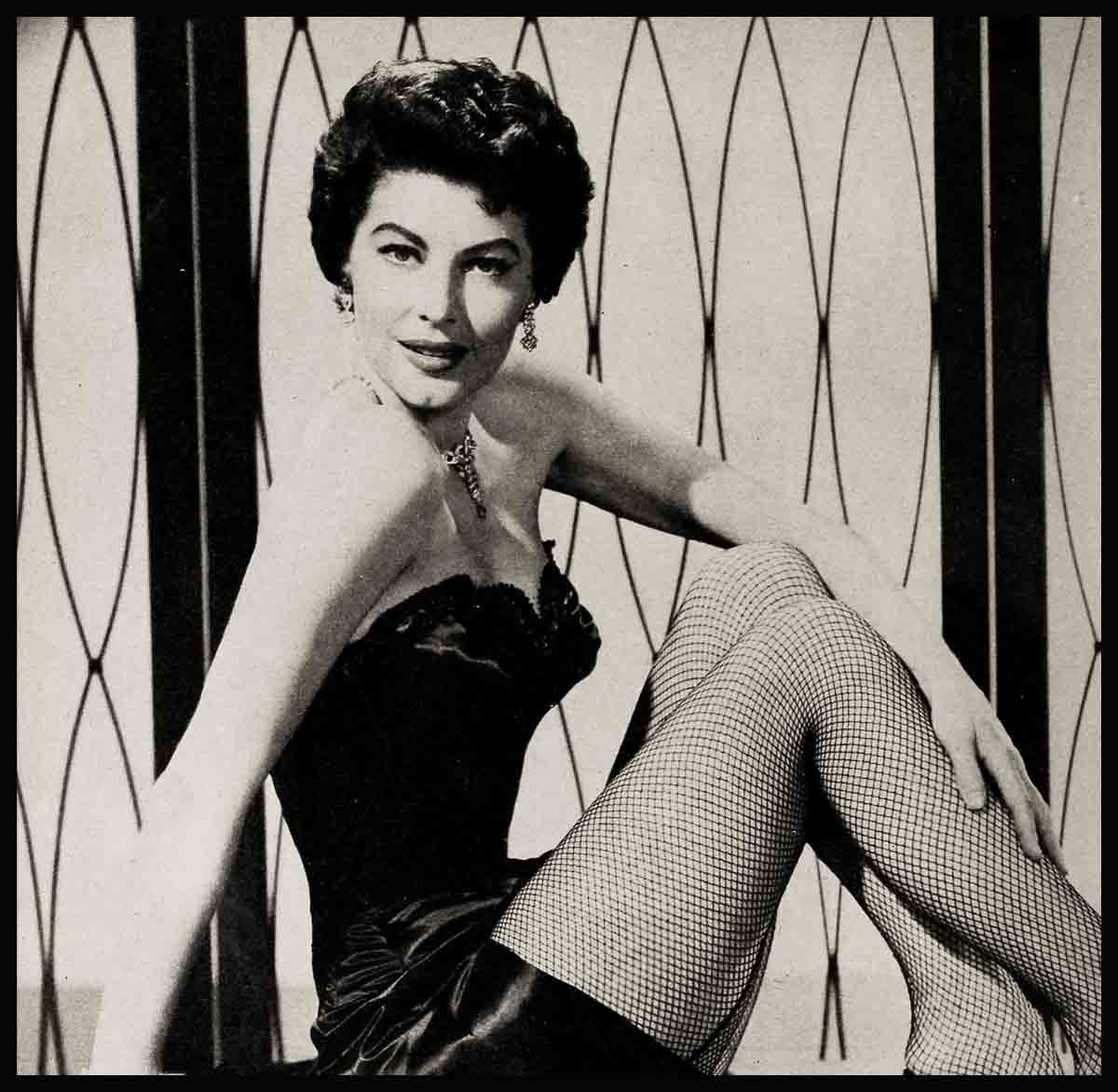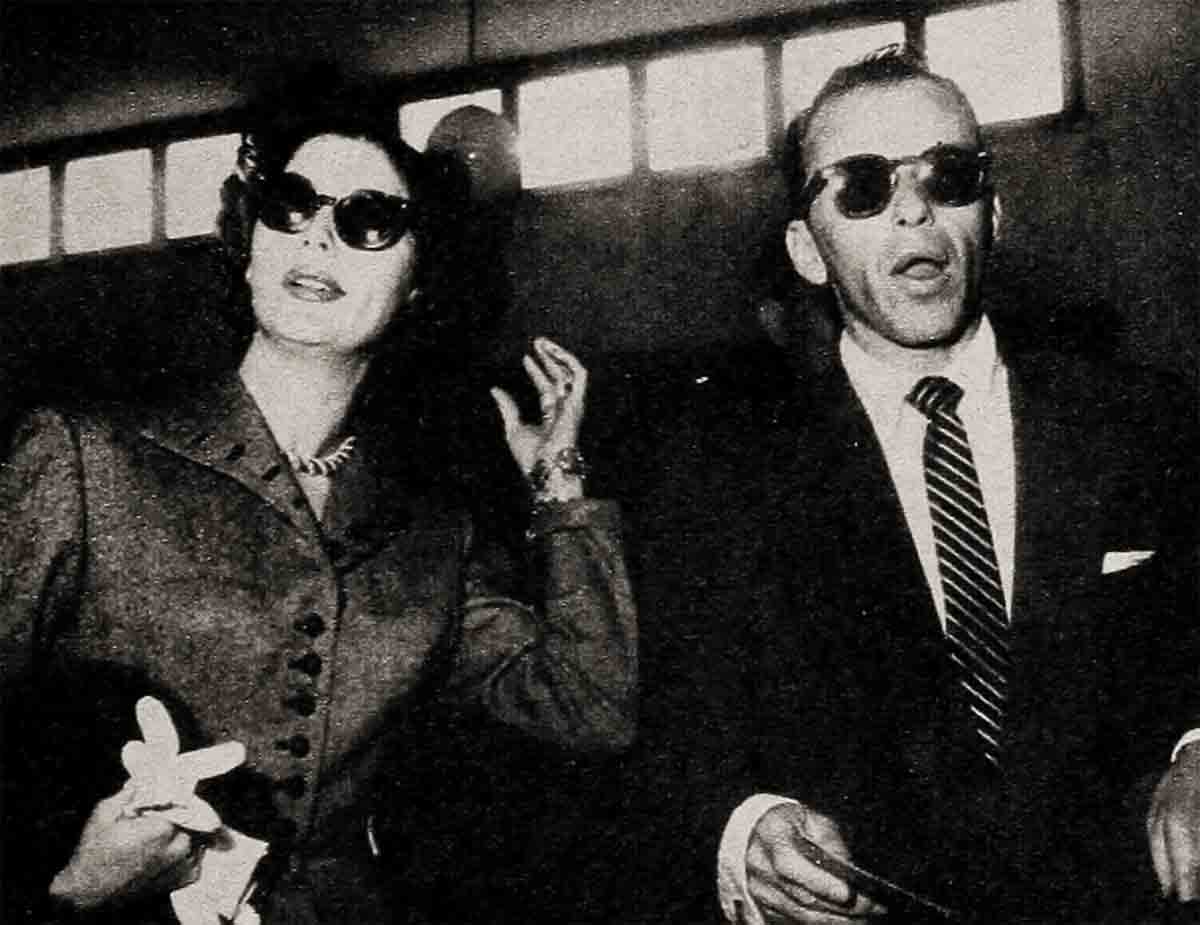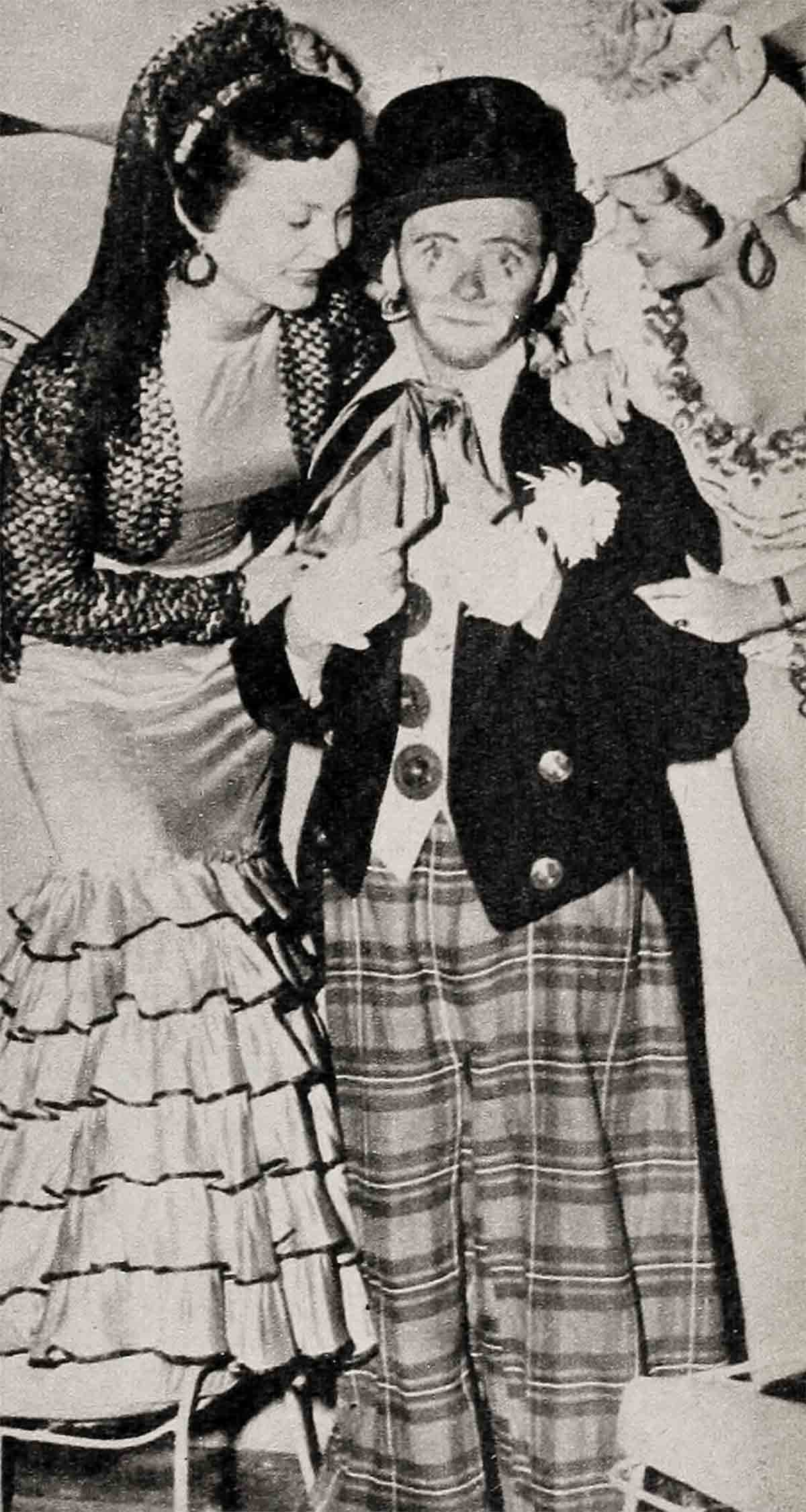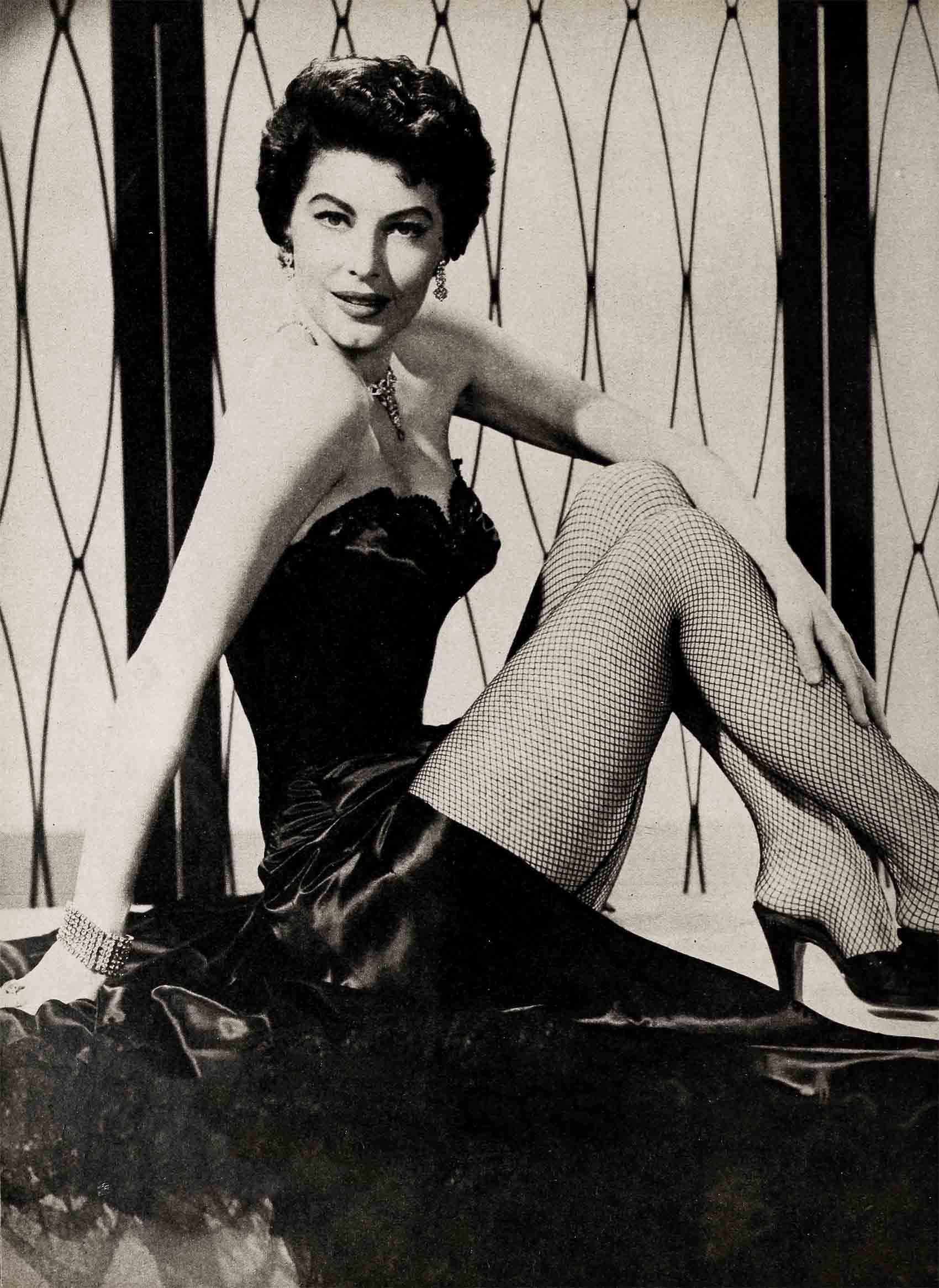
Ava Gardner and Frank Sinatra Tell The Truth To Louella Parsons
If Ava Gardner had only picked up the telephone and talked to Frank Sinatra, or if Frankie had overcome that innate stubbornness and said, “Let’s forget it, darling. We love each other,” Frankie would not have been in such a state that he landed in Mount Sinai Hospital and Ava wouldn’t have consulted a lawyer and threatened divorce.
But this was much too simple a procedure for two people who-have always chosen the hard way and let their quarrels become public knowledge. The night before Frankie’s doctor put him into a New York hospital, he was in a state bordering on a nervous breakdown. He was so bitterly depressed that he told me he didn’t care about his career. He wanted to give it up. He didn’t care whether he lived or died. Strangely enough, it was the first time he hadn’t berated Ava since their separation. On the contrary, he told me what a great girl she is. But he couldn’t understand why she had accepted a picture in Rome that would again put miles between them.
In Hollywood Ava was just as sick and unhappy as Frank but she confided to a close friend that she couldn’t stand any more and it was for her-own health and peace of mind that she decided she must leave Frankie even though she adored him. So she accepted The Barefoot Contessa that would take her miles away.
But when she heard that Frankie was sick she telephoned him three times—and he rushed to the coast to see her. If they make up again, how long will it last? No one on earth can possibly answer that baffling question.
I was in Las Vegas twice while Frank was singing at the Sands Hotel at that fabulous resort which is becoming the entertainment center of the west. Ava was in Palm Springs, but she and her crooner husband were much more than miles apart. They were widely separated by that ole debbil “pride.”
I saw Frankie many times during his singing engagement in Las Vegas. At his opening he sang his heart out. Never had he sung love songs with such feeling. He was singing right to Ava. This we all knew. He expected her momentarily and he was a happy boy. He was also proud that he had put on weight. Every time I saw him he said, “I think she will be here any hour.” But the hours lengthened into days and no Ava. The impulsive, unpredictable beauty chose to go to Palm Springs instead of joining Frankie. After their reconciliation in New York, he had expected her. Ava says Frankie had never invited her to come to Las Vegas.
Finally, when his tension had built up to such a point he couldn’t stand it any longer, Frankie opened his heart to me.
“I can’t eat. I can’t sleep. I love her.”
“You should be telling that to Ava, not to me,” I told Frankie. “Why, in heaven’s name, don’t you telephone her and tell her how you feel? I know she’s carrying a torch for you a mile high.”
Frankie’s lean jaw became set. He shook his head and said, “No, Ava doesn’t love me any more. If she did, she’d be here where she belongs—with me. Instead she’s in Palm Springs having a wonderful time.”
In vain I argued that Ava was just as unhappy as he was and had poured out her heart on more than one occasion.

“C’mon, Frankie,” I said, “why don’t you telephone?”
“No,” he replied. “Ava’s wrong this time. I’ve been wrong other times, but this time it’s all her fault. She’ll have to call me.”
“Why ‘wrong’?” I queried.
He hesitated a moment as though he were afraid that what he was going to say might sound foolish. Then he blurted out like a small, hurt boy, “She doesn’t understand that I’ve got a career to worry about, too. Why, Louella, she didn’t even come to my opening here! Why would she do a thing like that to me?
“That’s only part of it,” he continued. “Ever since our marriage, I’ve been at her beck and call. No matter where she’s been, Louella, I’ve flown to her regardless of the fact that I also had some important engagements. But I was willing to neglect them for her.”
I said nothing—just listened. Frankie has a way of disappearing when he doesn’t want to talk, and then I defy anyone to locate him. Now he wanted to talk. In fact, he had sought me out. It isn’t the first time he’s told me his troubles.
Perhaps he wouldn’t have been so eager then to unburden himself if he hadn’t been so deeply hurt by Ava’s failure even to send him a word of greeting on his opening night at the Sands. Frankie is much more sensitive than you’d think. He takes every little thing to heart.
This wasn’t a little thing. It was his love for his wife. But a series of little things had piled up until they became veritable mountains in his mind.
“Things happen. The public reads about them and in time forgets them,” he said sincerely, “but it isn’t as easy for those who experience the supposedly trivial incidents to forget about them.
“For instance, that incident in Italy, at the theatre,” he explained. “I’ve never told anybody what really happened there. I’ll tell you so you can see why I wasn’t very happy in England afterward.”
I knew Frankie was referring to all those stories about how he refused to go on and sing in Naples.
“I was already singing,” he said. “My representative in the wings beckoned for me to get off the stage. Seems he had a disagreement with the management over money. I walked off when he called me. The press said I didn’t keep my part of the bargain. Then when we were in England, I was upset about it.”
“Well, Frankie,” I said at the risk of his walking out on me, “you can’t blame Ava for that!”
“I’m just trying to show you,” he said defensively, “that I needed her sympathy and understanding.

“She wanted me to stay on in London. I didn’t want to leave her, of course, but I had to get to New York to rehearse my act at the Riviera. I only had three weeks to get it ready. Ava had to stay in England those three weeks to finish her picture. She simply couldn’t understand why I wanted to fly home without her.”
I nodded sympathetically. Career vs. Career is an old, old story to me after my years in Hollywood.
“You see what I mean,” Frank said eagerly. “My career didn’t seem important to her. We were cool when I left England, but I didn’t know it was a definite break. Then when I read in the New York papers that Ava was in town and hadn’t even let me know when she was arriving, it made everything worse. She didn’t come out to the Riviera when I opened. We didn’t talk. Finally, she saw my mother. My mother said to her, ‘All this fighting is no good. Why don’t you telephone Frank?’ ”
I didn’t get out of Frankie whether it was he who first called Ava or whether it was she who telephoned him. The important thing was that they did make up in New York. Ava went to the Riviera and became a wild Sinatra fan. When she’s with him, she never can resist him.
So once more they made up. Ava and Frankie always reconcile in the most spectacular manner. I remember well when they were separated in Hollywood about a year ago. Frankie was on the Adlai Stevenson Committee and attended a Democratic Rally. I didn’t happen to be there, but those who were did a double take. There were Frankie and Ava on the stage together as happy as happy could be. I have learned through years of experience to stand on the sidelines and watch with the rest of the world for their next move.
All I know is what Frankie and Ava tell me. They both say that they love each other. Well, this is a curious kind of love, but I suppose when two people are so madly in love anything can happen.
When he repeated to me that this time it was all Ava’s fault, that she would have to be the one to break down the barrier between them, I took his hand. “Frankie,” I said, “you’re wrong. Ava’s no more at fault than you are. You’re proud. She’s proud. You’re both acting like teen-agers. If you love a girl and she loves you, forget about the things that have happened and try to salvage your life together.”
Shortly after that, I returned to Hollywood. I telephoned Ava. She had been avoiding me, saying, “Oh, you’re all on Frank’s side and wouldn’t understand my side of the story.”
“You’re making the mistake of a lifetime, Ava,” I told her. “Frank loves you dearly.”
Her voice trembled. “Do you mean it? Do you think he does really love me?” she asked again in wonderment, more like a shy school-girl who isn’t sure of herself than a famous movie star and one of the most beautiful women in the world.
“You know he does,” I said.
“If he really loves me and thinks my career interferes, I’d give it up and anything else, just to be with him,” she said softly. “He means more to me than anything else in the world.”
As things happened, Ava called her attorney, Neil McCarthy.
That added fire to Frankie’s already burning resentment. The finality of consulting an attorney and the resulting publicity made Frankie more adamant than ever. He was right and she was wrong.

There are those who say that both Ava and Frankie are glad to be out of a bad situation. Ava is reported to have said, “You can’t compete with three children.” She never said it to me. Frank does love his children dearly but Ava has never objected to his seeing them.
Perhaps Ava is right. Perhaps the shadow of Frank’s three beautiful children is too much to forget. He took me aside one night in Las Vegas and said, “Have you seen the kids?”
I told him I had seen the children.
“Aren’t they wonderful?” he said. “Did you ever see anything cuter than little Tina? She’s a smart one!”
Little Frankie has inherited his father’s talent and plays the piano beautifully. Nancy, Jr., thirteen, feels keenly any adverse publicity about her adored and adoring father. Perhaps Ava is right.
Yet I firmly believe that Ava also is so much in his heart that he can’t forget her. I believe that Ava loves him, but she’s so jealous she believes everything people say.
Maybe it seems incongruous that a girl as beautiful and famous as Ava Gardner could be jealous or unsure of her own ability to hold a man. Yet it happens all the time in Hollywood. The make-believe lives these glamorous actresses portray in movies are over when they leave the studio. Offscreen, they can be scared and uncertain about their ability to hold a man.
Ava was jealous. She believed everything she heard or read about him. The most ridiculous story was the one about Deborah Kerr’s being the girl Frank was in love with and the real reason for his split with Ava.
Deborah talked to me about this. She scoffed at the gossip and said how foolish it all was. She and Frankie did talk together. Deborah knew he was unhappy and miserable over his estrangement from Ava and he told her his troubles. Deborah and Frank became friends when they worked together in From Here To Eternity.”
“We were never anything more than friends,” Deborah told me. “I tried to comfort Frank about Ava.”
Unfortunately, Ava believed that Deborah and Frankie were talking about their love for each other.
When I was in New York recently, I saw Frank several times. We first met at a party. I thought he looked bad. His nerves were on edge and although every woman in the place had her eyes on him, he chose to draw me aside and sit on the stairs with me so we could talk. Frankie, however, was as stubborn as ever.
“Let me call Ava,” I suggested.
“You can’t,” he said, “I don’t know her number. She changed it. My mother telephoned me yesterday,” he told me, “and said she had talked with Ava.
“I asked my mother, Why didn’t Ava call me?” She still thinks Ava and I should get together again.
“ ‘Why don’t you telephone Ava?’ my mother said.”
“Why don’t you, Frankie?” I asked him.
“She has to come to me first,” he said.
“You mean you want to wreck your whole life just because you’re stubborn and she’s stubborn?” I asked him. The time and place were different but the situation had not changed. Neither had Sinatra.
What can you do with two people like that? I read that Ava had said to some reporter that she couldn’t take Frank any longer, that he was ruining her life. Ava never said that to me. She was a very unhappy little girl who spoke of her love and her problems.
Ava and Frank have had anything but a peaceful marriage. After several delays, they were married in Philadelphia in November, 1951. Almost from the beginning, there were bickerings and quarrels. Frank would leave home in a burst of temper, and reports that Ava had said it was all over between them, that she had all she could take, reached my ears.
Before they were married, Ava went to Spain to make a picture and the papers were full of the love letters and poems dedicated to her by Mario Cabre, the handsome bullfighter, actor and poet.
Cabre was crazy about Ava. Many men have been crazy about her. When Frank heard about this competition, he hurried to Spain, taking along an emerald necklace as a bejewelled token of his love.
It was then that the tempestuous romance between the singer and the actress came out into the open. They had to overcome many obstacles, both legal and financial, before they could marry. But marry they did. No price was too great.
As beautiful as Ava is, I’ve never known her to look twice at any other man since she married Frank. He seems to think she does, but he’s wrong. Ava’s whole heart has belonged to Frankie from the time they discovered they were in love. She has told me again and again of her love for him.
Curiously enough, Ava was much more tender, kind and thoughtful when everyone was against Frank. She worried over him and worked as hard as I have seen anybody work to get him the part of Maggio in From Here To Eternity.
Frank wanted to play Maggio more than anything in the world. He paid his own way to the coast to take the screen test. He received only $10,000 for his work. That is comparative chicken feed to Frankie who’s earned over $50,000 a week in theatre appearances. He seemed to have an intuition that Maggio would save his career.
And it did. He needed that success.
Frank had throat trouble shortly after his marriage to Ava. His voice seemed to have left him. He couldn’t get a job making a picture. He had one terrific flop, Meet Danny Wilson, an embarrassingly bad picture, a sort of semi-biographical story of Sinatra’s own career.
Frankie, who is very sensitive, felt he was finished after this film venture.
But happiness, not only with Ava but with his career, brought back his voice. He started to sing as the old Frankie had sung. As one critic said, “There hasn’t been anybody as good as Sinatra since Sinatra.”
It had been a bitter pill for this boy born in New Jersey to feel he was losing his grip on the fancy of the public. When everyone was asking, “Is Sinatra finished?” no one was more anxious to know the answer than Sinatra himself.
Ava, who stuck by him so closely during those worried months, never for a moment doubted that he would recapture his hold on his fans.
After Eternity, Sinatra’s stock soared. Offers poured in. His voice which had troubled him so long was better than ever.
Despite this, Ava insists careers had nothing to do with their troubles. She said, “Will you please say that careers had nothing to do with our separation? There were many things leading to it, but they are all too personal to even tell you. Our problems are our own affair. I won’t say I won’t make up, but I can’t go on with the war we’re having.”
That was as much as Ava would say, as much as she ever said about her troubles; beyond assuring me she loved Frankie, adored him and would give up everything for him.
I’m sure she meant that. Frankie’s high temper and his many quarrels with her were too difficult to take. On the advice of her lawyer, she has said little, but what little she has said had a lot of meaning.
Ava has always felt I was completely on Frank’s side. That’s because I know Frankie so much better. I’ve known him so much longer rand I’ve been so much closer to him. He was a friend of my late husband and used to come to the hospital to see Dr. Martin, bring him a book and tell him a story. I could never forget that.
This hasn’t influenced me, however, in trying to be fair to Ava. I know she has her difficulties but I do think Frankie needs her and she shouldn’t let little silly things break up their marriage. In Hollywood, the town is sharply divided. Frankie’s friends are all for him. Ava’s friends think she got a raw deal. As for me, I’m on both their sides.
Ava, like Frankie, has tasted the sweet nectar of adulation and success. That’s a thing that’s hard for any man or woman to give up. There have been instances in which an actress retires at the height of her career but I’ve never heard of any woman’s being really happy about it.
Giving up her career doesn’t seem to me to be the solution to Ava’s problem. It’s not that simple. I know that these two high-strung, highly emotional people believe now that it’s all over because this is the first time an attorney has been consulted. The fact that Ava did consult an attorney hurt Frankie deeply and every time I’ve seen him since, he has mentioned it with great bitterness.
I asked him one night to go out to a nightclub with a group of us.
He reached over: and kissed me and said, “I love you, but I’m not going any place in New York where someone will say I’m out on a party where there are girls.”
How can you figure out a man like that? He didn’t want to hurt Ava by being seen with another girl, no matter how innocently, and yet he is hurting her much worse by his stubborn silence.
Once more I said to him that Ava was miserable and that she, too, hasn’t been seen with anyone.
“Then why is she going to Rome to make a picture? How are we going to make up if she’s going to be so far away?” he pleaded.
“Do you want to make up again?” I asked.
The look he gave me would have melted Ava had she been anywhere in sight.
THE END
—BY LOUELLA PARSONS
It is a quote. MODERN SCREEN MAGAZINE FEBRUARY 1954




